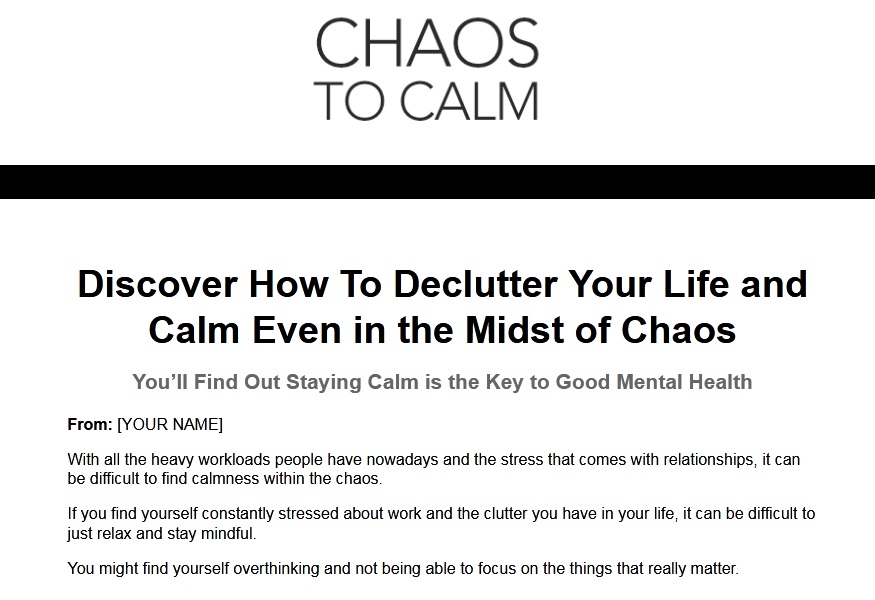Salespage Snapshot

Table of Contents
Introduction 6
What is Clutter: Identifying What Triggers Your Stress 8
The Impact of the Stress from Clutter 10
What Causes Stress and Clutter in Your Life? 13
Sentimental Value 13
“But What If I Need This?” 14
Gift Guilt 15
Buying Things You Don’t Actually Need 15
What Causes the Stress in Your Life? 16
Stress and Mental Health: What You Need to Know 19
Stress on the Body 19
Stress on the Mind 21
Stress From Clutter Will Make It Harder to Clean 23
An Introduction to Mindfulness 25
What is Mindfulness? 25
What Does Mindfulness Do for Mental Health? 26
How to Practice Mindfulness Daily 29
Slow Down 29
Engage In Your Everyday Activities with More Focus 30
Take Note of Your Triggers 32
Rework Harmful Thoughts 33
Ground Yourself 35
Pause and Feel 37
Tips For Daily Mindfulness 38
How to Organize Your Mental Filing Cabinet 41
Journal to Dump Out Your Thoughts 41
See What You Wrote 42
Prioritize the Thoughts You See 43
Break Down Complicated Thoughts 45
Reflect 46
The Things Beyond Your Control (And Why You Shouldn’t Stress) 49
The Past 49
Change 50
Other’s Perspective of You 50
The Future 51
Remember Thought Priorities 52
Your Daily Plan for Staying Calm and Confident (Even on Busy Days) 54
Start Slow 54
Get Enough Sleep 55
Take Mental Breaks 55
Practice Positive Thinking 56
Take Responsibility 57
End Your Day with Gratitude 57
Make the Best Plan for You 58
Conclusion 61
Sample Content Preview
Let’s take a step back and see how you could have gotten to this point. A cluttered home and a stressed mind don’t happen overnight. Instead, it happens from a mixture of triggers and a series of events that brings items into your space and doesn’t let you get rid of them. Let’s go over what could have led you to the cluttered space that you have.
Sentimental Value
One of the most common ways that clutter builds up is the refusal to get rid of certain items because of sentimental value. Keep in mind, we aren’t talking about the necklace that has been passed through your family or the outfit that you got from your favorite person that you’ve worn a million times.
As humans, we can find sentimental value in so many things. You might have a shirt that you haven’t worn in years, but it was the shirt you wore on a first date that you can’t bear to part. You may even find sentimental value in old homework assignments if you have recently graduated from school.
However, just because something has sentimental value, that doesn’t mean that you need to keep it. You don’t need to keep homework assignments from years prior and sometimes you have to let go of clothes that you never wear anymore even if it was from a fun day. When you hold onto the things that you don’t use for the sake of sentimental value, you clutter your space and therefore, clutter your mind with the things that you don’t need. “But What If I Need This?”
Another common cause of clutter is the fear that you will need something in the future. These items tend to be found in the junk drawer stashed away in a closet.
In some cases, wondering if you will need something in the future is necessary. For financial and legal documents, you should put more consideration into whether you’ll need them in the future or not. In many cases, these legal documents should be kept under the idea that you may need them within the next 7 years from receiving that document.
Then there are the items that you definitely won’t need in the future. Crafty people experience this problem a lot. You’ll find an item and you’ll think “I can make something with this,” and stash the item with your craft supplies. However, years later you look at that same object that you haven’t done anything with. These items build clutter and should be removed.
Gift Guilt
Have you ever been given a gift that you don’t have a use for but feel too guilty to get rid of it? This is something that everyone has felt at least once. However, this guilt about giving a gift a new home means that this item is taking up space in your home which leads to a build-up of clutter.
Cards are a huge contributor to this. So many people hold onto birthday or Christmas cards out of guilt of throwing them away. However, this will build up in your desk or a drawer and become stressful clutter.
Buying Things You Don’t Actually Need
It is highly normalized to constantly buy things. New gadgets are always being advertised as making your life so much easier and that you can’t live without them! Then, when you cave and buy the object, you get a few uses out of it before going back to the way you used to do things. Now you have another gadget that you don’t need cluttering your home.
Buying stuff that you don’t need not only hurts your wallet but also hurts your mental health as you add stressful clutter to your home.
What Causes the Stress in Your Life?
Bad shopping habits aren’t the only thing that may be causing clutter-stress in your life. Sometimes, stress causes clutter. Work can be a huge contributor to both clutter and stress.
Imagine that you are at your desk and suddenly your boss drops off a ton of paperwork to get through by the end of the day. This adds both stress and clutter to your space. You have a huge task dangling over your head and a bunch of papers is covering your desk.
Another situation that will build clutter is when you become stressed about completing a project. When you put all your focus toward a project, taking care of your space becomes a secondary priority. By the time you complete the project, your stress doesn’t end because now you are surrounded by clutter.
Be aware of what is causing the clutter and stress in your lives. Is the stress coming first or is the clutter? Knowing what is causing the clutter and stress in your life will help you figure out the best path for removing both the stress and clutter from your mind.
Stress and Mental Health: What You Need to Know The impact of stress on the mind and body was touched on earlier, but let’s dive deep into how stress over time will hurt the body.
Stress on the Body
Stress in the body is controlled by a hormone called “cortisol.” This hormone can be good for the body in the case of an emergency. When the body is flooded with cortisol from stress and/or fear, the body will experience quickened breath, quickened heart rate, elevated blood pressure, and digestion slows among other factors.
When you are in an emergency, this stress helps get you out of the situation while preventing harm. However, the stress we are talking about won’t save you from a life-threatening emergency. Instead, the stress we are discussing from clutter will increase your cortisol levels for extended periods. When a person experiences stress (even if it is a low amount of stress) for extended periods, then the effects of the hormone will damage the body.
Other Details- 1 Ebook (PDF), 61 Pages
- 2 Graphics (GIF, PNG)
- 1 Salespage (HTML)
- Checklist, Resource Cheat Sheet, Mindmap, Optin Page, Social Media Images, Email Swipes
- Year Released/Circulated: 2022
- File Size: 194,119 KB
License Details:
[YES] Can be sold
[YES] Can be used for personal use
[YES] Can be packaged with other products
[YES] Can modify/change the sales letter
[YES] Can be added into paid membership websites
[YES] Can put your name on the sales letter
[YES] Can be offered as a bonus
[YES] Can be used to build a list
[YES] Can print/publish offline
[YES] Can convey and sell Personal Use Rights
[YES] Can convey and sell Resale Rights
[YES] Can convey and sell Master Resale Rights
[NO] Can modify/change the main product
[NO] Can modify/change the graphics and ecover
[NO] Can be given away for free
[NO] Can be added to free membership websites
[NO] Can convey and sell Private Label Rights














